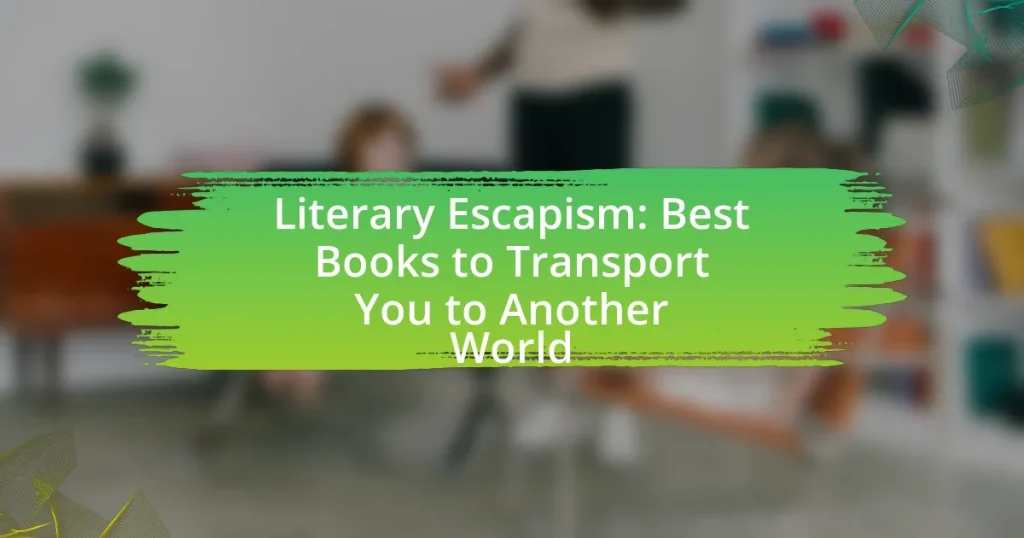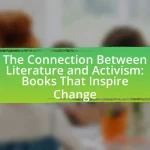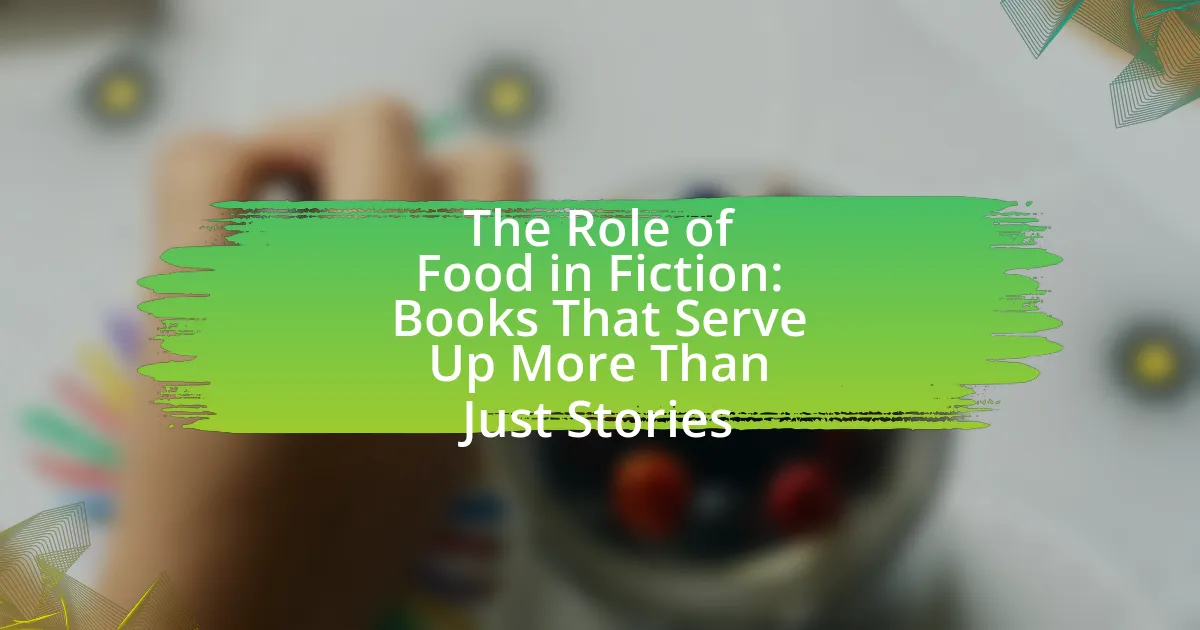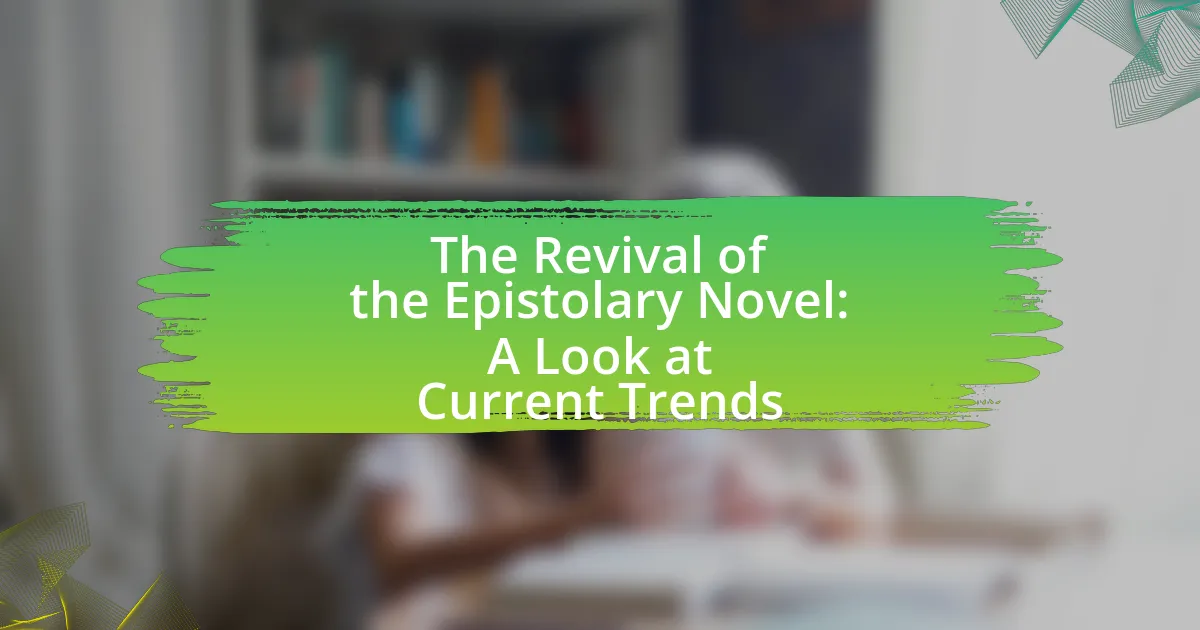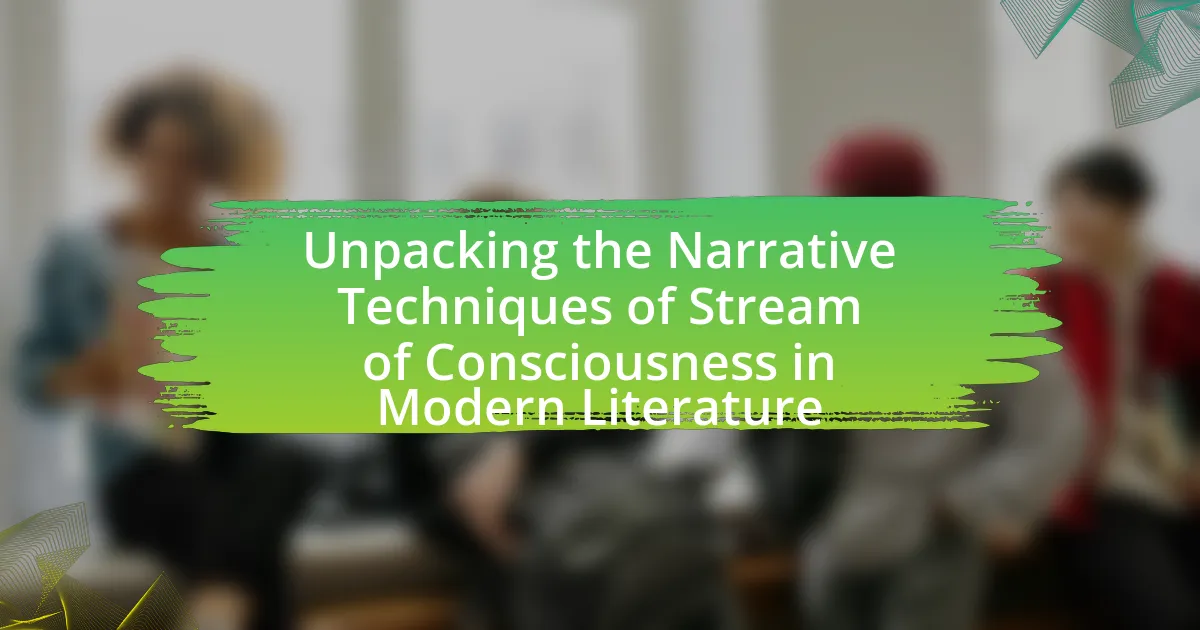Literary escapism is a genre that allows readers to immerse themselves in fictional worlds, providing a temporary escape from reality through imaginative settings and engaging narratives. This article explores the psychological benefits of literary escapism, including stress relief, enhanced empathy, and improved mood. It discusses the characteristics of effective escapist literature, the genres most associated with it, and the motivations behind readers’ choices. Additionally, the article highlights notable books and authors in the genre, offering recommendations for both classic and contemporary escapist literature that can transport readers to alternate realities.
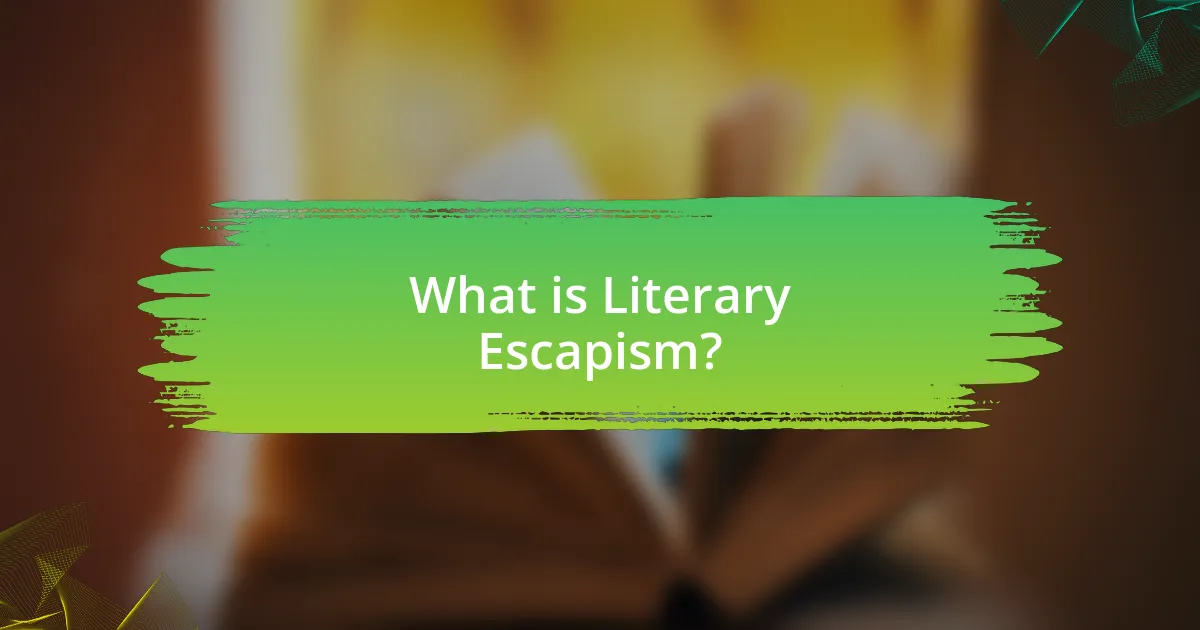
What is Literary Escapism?
Literary escapism is a genre of literature that allows readers to immerse themselves in fictional worlds, providing an escape from reality. This form of escapism often features imaginative settings, fantastical elements, and engaging narratives that transport readers away from their everyday lives. The concept is supported by the idea that literature can serve as a refuge, enabling individuals to experience adventures, emotions, and perspectives beyond their own. Studies have shown that engaging with escapist literature can enhance mood and reduce stress, highlighting its psychological benefits.
How does Literary Escapism impact readers?
Literary escapism significantly impacts readers by providing an immersive experience that allows them to temporarily escape their reality. This form of engagement can lead to enhanced emotional well-being, as studies indicate that reading fiction can improve empathy and reduce stress levels. For instance, research published in the journal “Psychological Science” by Mar et al. (2006) found that individuals who read fiction scored higher on measures of empathy compared to those who read non-fiction. Additionally, literary escapism can foster creativity and imagination, as readers explore diverse worlds and perspectives, which can stimulate cognitive functions and inspire innovative thinking.
What psychological effects does Literary Escapism have?
Literary escapism has several psychological effects, including stress relief, enhanced empathy, and improved mood. Engaging with fictional narratives allows individuals to temporarily distance themselves from real-life challenges, which can reduce anxiety and promote relaxation. Research indicates that reading fiction can enhance empathy by allowing readers to experience diverse perspectives and emotions, fostering a deeper understanding of others. Additionally, studies have shown that immersing oneself in a story can lead to increased happiness and satisfaction, as it provides an emotional outlet and a sense of adventure.
How does Literary Escapism differ from other forms of escapism?
Literary escapism differs from other forms of escapism primarily in its reliance on narrative and language to transport readers into alternate realities. While other forms of escapism, such as watching movies or playing video games, often engage visual and auditory senses, literary escapism engages the imagination through text, allowing for deeper cognitive involvement and personal interpretation. Studies indicate that reading fiction can enhance empathy and emotional intelligence, as it requires readers to visualize characters and scenarios, creating a unique immersive experience distinct from visual media.
Why do readers seek Literary Escapism?
Readers seek literary escapism primarily to experience an emotional and mental reprieve from their daily lives. This desire for escape allows individuals to immerse themselves in different worlds, narratives, and characters, providing a temporary break from reality. Research indicates that engaging with fictional stories can reduce stress and enhance mood, as readers often find solace in the adventures and challenges faced by characters, which can mirror their own struggles. Furthermore, studies show that literary escapism can foster empathy and understanding, as readers connect with diverse perspectives and experiences, enriching their emotional intelligence.
What are the common motivations behind choosing escapist literature?
Common motivations behind choosing escapist literature include the desire for distraction, emotional relief, and exploration of alternate realities. Readers often seek to escape from their daily stresses and challenges, finding solace in fictional worlds that provide a temporary reprieve from reality. Studies indicate that engaging with escapist literature can enhance mood and reduce anxiety, as readers immerse themselves in narratives that allow them to experience adventures and emotions outside their own lives. This form of literature serves as a coping mechanism, enabling individuals to process their feelings and gain perspective through the experiences of characters in fantastical settings.
How does escapist literature fulfill emotional needs?
Escapist literature fulfills emotional needs by providing readers with an immersive experience that allows them to temporarily escape their reality and engage with alternative worlds. This genre often features relatable characters and compelling narratives that resonate with readers’ emotions, offering solace during challenging times. Research indicates that engaging with escapist literature can lead to reduced stress and anxiety, as it allows individuals to disconnect from their daily struggles and immerse themselves in imaginative scenarios. For instance, a study published in the journal “Psychology of Popular Media Culture” found that readers of fantasy and science fiction reported higher levels of emotional relief and satisfaction compared to those who engaged with more realistic genres.
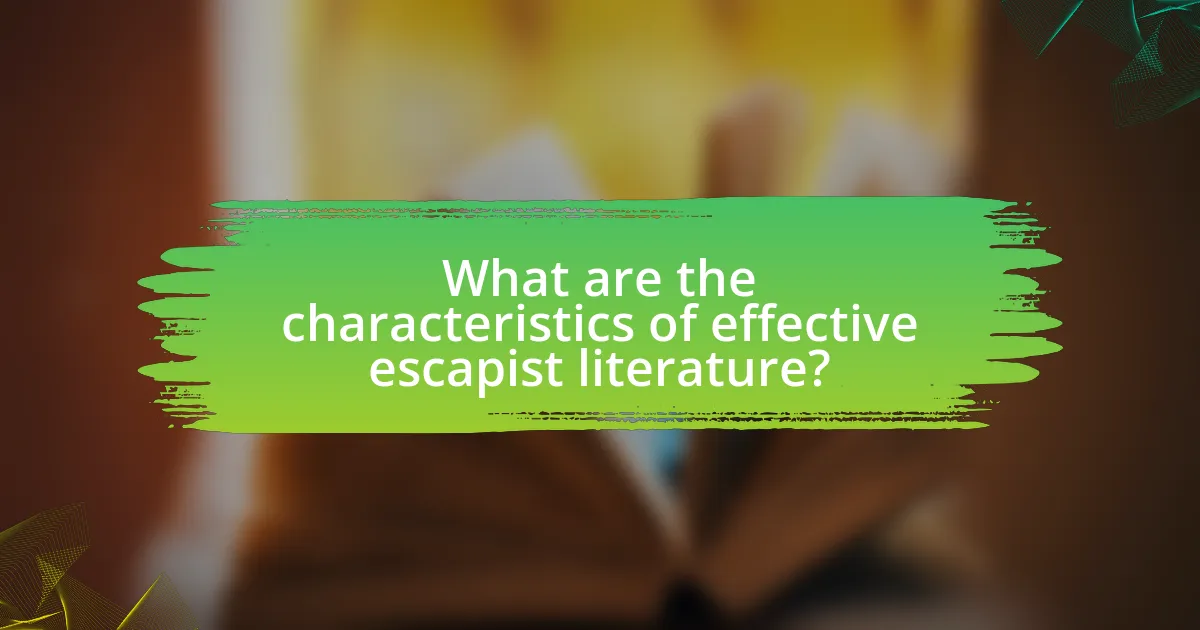
What are the characteristics of effective escapist literature?
Effective escapist literature is characterized by immersive world-building, relatable characters, and engaging plots that allow readers to temporarily escape reality. Immersive world-building creates detailed and imaginative settings that transport readers to different realms, enhancing the sense of escape. Relatable characters foster emotional connections, making readers invested in their journeys and struggles. Engaging plots often include adventure, fantasy, or romance elements that captivate the reader’s attention and provide a distraction from everyday life. These characteristics collectively contribute to the effectiveness of escapist literature in providing a refuge from reality.
What genres are most associated with Literary Escapism?
The genres most associated with Literary Escapism are fantasy, science fiction, and romance. Fantasy allows readers to immerse themselves in magical worlds and mythical creatures, while science fiction explores futuristic settings and advanced technology, providing an escape from reality. Romance often transports readers into emotionally charged narratives that focus on love and relationships, offering a comforting and idealized experience. These genres are popular for their ability to create vivid, imaginative settings that enable readers to temporarily leave their everyday lives behind.
How do fantasy and science fiction contribute to escapism?
Fantasy and science fiction contribute to escapism by creating immersive worlds that allow readers to temporarily escape their reality. These genres often feature elaborate settings, unique characters, and complex plots that transport individuals to realms where the ordinary rules of life do not apply. For instance, works like J.R.R. Tolkien’s “The Lord of the Rings” and Isaac Asimov’s “Foundation” series provide intricate universes filled with adventure and possibility, enabling readers to experience excitement and wonder beyond their daily lives. This ability to engage with fantastical elements and futuristic concepts serves as a mental refuge, allowing individuals to explore themes of heroism, morality, and the unknown, which can be particularly appealing during challenging times.
What role do romance and adventure play in escapist literature?
Romance and adventure serve as essential elements in escapist literature by providing readers with an immersive experience that allows them to temporarily escape reality. These genres create compelling narratives filled with emotional connections and thrilling quests, which engage readers’ imaginations and transport them to fantastical worlds. For instance, novels like “Pride and Prejudice” by Jane Austen and “The Hobbit” by J.R.R. Tolkien exemplify how romance and adventure intertwine to captivate audiences, offering both emotional depth and excitement. This combination not only entertains but also fulfills a psychological need for escapism, allowing individuals to explore desires and experiences outside their everyday lives.
What elements make a book truly transportive?
A book is truly transportive when it effectively combines immersive world-building, relatable characters, and a compelling narrative. Immersive world-building creates a vivid setting that allows readers to visualize and experience the story’s environment, often enhanced by detailed descriptions and unique cultural elements. Relatable characters foster emotional connections, making readers invest in their journeys and struggles. A compelling narrative, characterized by engaging plots and well-crafted pacing, keeps readers captivated and eager to turn the pages. These elements work together to create an experience that allows readers to escape their reality and become fully absorbed in the story.
How do world-building and character development enhance escapism?
World-building and character development enhance escapism by creating immersive environments and relatable characters that allow readers to temporarily escape their reality. Detailed world-building establishes a rich, believable setting that draws readers in, making them feel as if they are part of the narrative. For instance, J.R.R. Tolkien’s Middle-earth is meticulously crafted with its own history, languages, and cultures, which captivates readers and transports them to a different realm. Similarly, well-developed characters provide emotional connections, allowing readers to empathize with their struggles and triumphs. This connection fosters a deeper engagement with the story, as seen in the character arcs of Harry Potter, where readers invest in his journey and growth. Together, these elements create a compelling narrative that facilitates a mental escape from everyday life.
What narrative techniques are commonly used in escapist literature?
Escapist literature commonly employs narrative techniques such as immersive world-building, first-person perspectives, and linear storytelling. Immersive world-building creates detailed and imaginative settings that allow readers to escape reality, as seen in works like J.R.R. Tolkien’s “The Lord of the Rings,” where the richly developed Middle-earth captivates the audience. First-person perspectives enhance emotional connection and personal engagement, allowing readers to experience the protagonist’s journey intimately, as demonstrated in “The Catcher in the Rye” by J.D. Salinger. Linear storytelling simplifies plot progression, making it easier for readers to follow and become engrossed in the narrative, a technique effectively utilized in many adventure novels. These techniques collectively foster an engaging and transportive reading experience, characteristic of escapist literature.
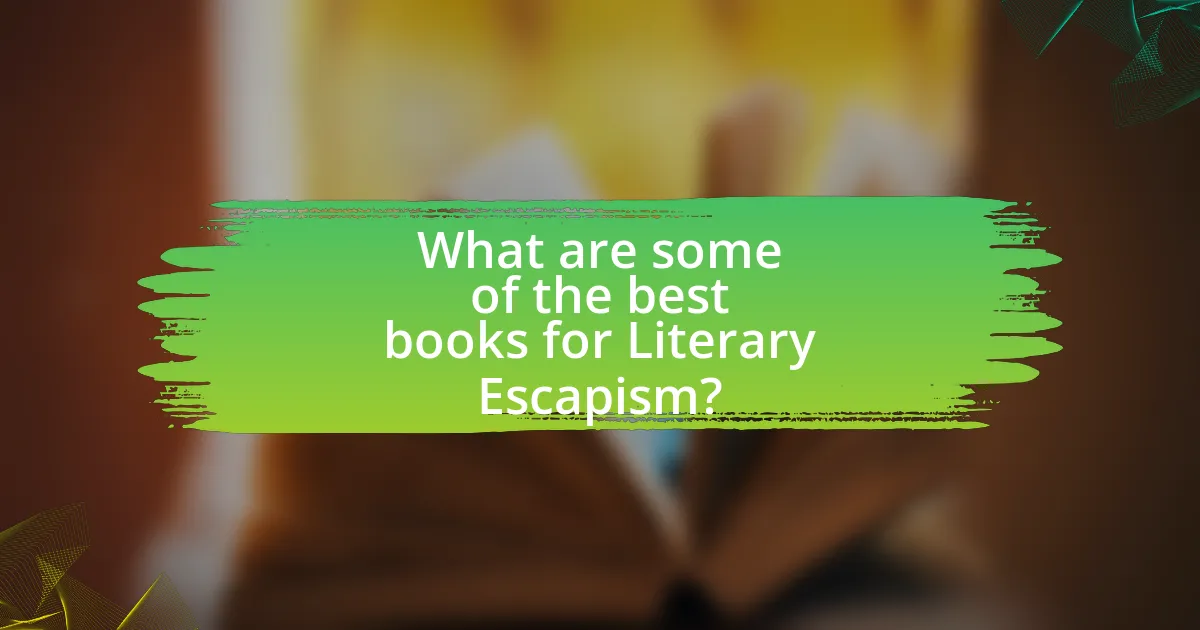
What are some of the best books for Literary Escapism?
Some of the best books for literary escapism include “The Night Circus” by Erin Morgenstern, “The Hobbit” by J.R.R. Tolkien, and “The Secret Garden” by Frances Hodgson Burnett. “The Night Circus” immerses readers in a magical competition between two young illusionists, creating a vivid world filled with wonder. “The Hobbit” transports readers to Middle-earth, where Bilbo Baggins embarks on an adventurous quest, showcasing Tolkien’s rich world-building. “The Secret Garden” invites readers into a hidden garden that transforms the lives of its characters, emphasizing themes of healing and rejuvenation. These books are celebrated for their ability to whisk readers away to enchanting realms, making them ideal for those seeking literary escapism.
Which classic novels are considered escapist literature?
Classic novels considered escapist literature include “Alice’s Adventures in Wonderland” by Lewis Carroll, “The Count of Monte Cristo” by Alexandre Dumas, and “The Wonderful Wizard of Oz” by L. Frank Baum. These works transport readers to fantastical worlds, offering an escape from reality through imaginative storytelling and adventure. For instance, “Alice’s Adventures in Wonderland” features a whimsical journey filled with peculiar characters and surreal experiences, making it a quintessential example of escapism in literature.
What themes in classic literature resonate with escapist readers?
Themes in classic literature that resonate with escapist readers include adventure, romance, and the exploration of fantastical worlds. Adventure themes, such as those found in “Treasure Island” by Robert Louis Stevenson, allow readers to experience thrilling journeys and quests. Romance, exemplified in works like “Pride and Prejudice” by Jane Austen, offers an escape into idealized relationships and societal intrigues. Additionally, the exploration of fantastical worlds, as seen in “Alice’s Adventures in Wonderland” by Lewis Carroll, invites readers to immerse themselves in imaginative settings that defy reality. These themes provide a means for readers to temporarily escape their everyday lives and engage with narratives that transport them to different realms.
How have classic novels influenced modern escapist literature?
Classic novels have significantly influenced modern escapist literature by establishing foundational themes, character archetypes, and narrative structures that continue to resonate with contemporary readers. For instance, works like “Alice’s Adventures in Wonderland” by Lewis Carroll and “The Adventures of Tom Sawyer” by Mark Twain introduced imaginative worlds and adventurous protagonists, which modern authors often emulate to create immersive experiences. Additionally, the use of detailed world-building and complex characters in classics such as “The Lord of the Rings” by J.R.R. Tolkien has set a standard for modern fantasy literature, inspiring authors like J.K. Rowling and George R.R. Martin. These classic texts not only provide a template for storytelling but also evoke a sense of nostalgia and familiarity that enhances the escapist experience for readers today.
What contemporary books should you read for an escape?
Contemporary books that provide an escape include “The Night Circus” by Erin Morgenstern, “Where the Crawdads Sing” by Delia Owens, and “Circe” by Madeline Miller. “The Night Circus” immerses readers in a magical competition between two young illusionists, creating a richly imaginative world. “Where the Crawdads Sing” combines a coming-of-age story with a murder mystery set in the marshes of North Carolina, offering both beauty and intrigue. “Circe” reinterprets the myth of the witch from Homer’s “Odyssey,” allowing readers to explore themes of isolation and empowerment in a fantastical setting. Each of these books has received critical acclaim and has captivated audiences, making them ideal choices for literary escapism.
Which recent releases have gained popularity in the escapist genre?
Recent releases that have gained popularity in the escapist genre include “The Invisible Life of Addie LaRue” by V.E. Schwab and “Project Hail Mary” by Andy Weir. “The Invisible Life of Addie LaRue,” published in 2020, has captivated readers with its blend of fantasy and historical fiction, exploring themes of identity and immortality. “Project Hail Mary,” released in 2021, has attracted attention for its compelling science fiction narrative that combines adventure and survival in space. Both titles have received critical acclaim and have topped bestseller lists, indicating their strong appeal within the escapist genre.
What are the standout features of these contemporary escapist novels?
Contemporary escapist novels are characterized by immersive world-building, relatable characters, and engaging plots that provide readers with an emotional escape from reality. These novels often feature richly detailed settings that transport readers to fantastical realms or idyllic locations, enhancing the sense of adventure and wonder. Additionally, relatable characters often face challenges that resonate with readers, allowing for emotional connections that deepen the escapist experience. Engaging plots typically include elements of adventure, romance, or mystery, which keep readers invested and eager to turn the pages. These features collectively create a compelling narrative that allows readers to temporarily step away from their everyday lives.
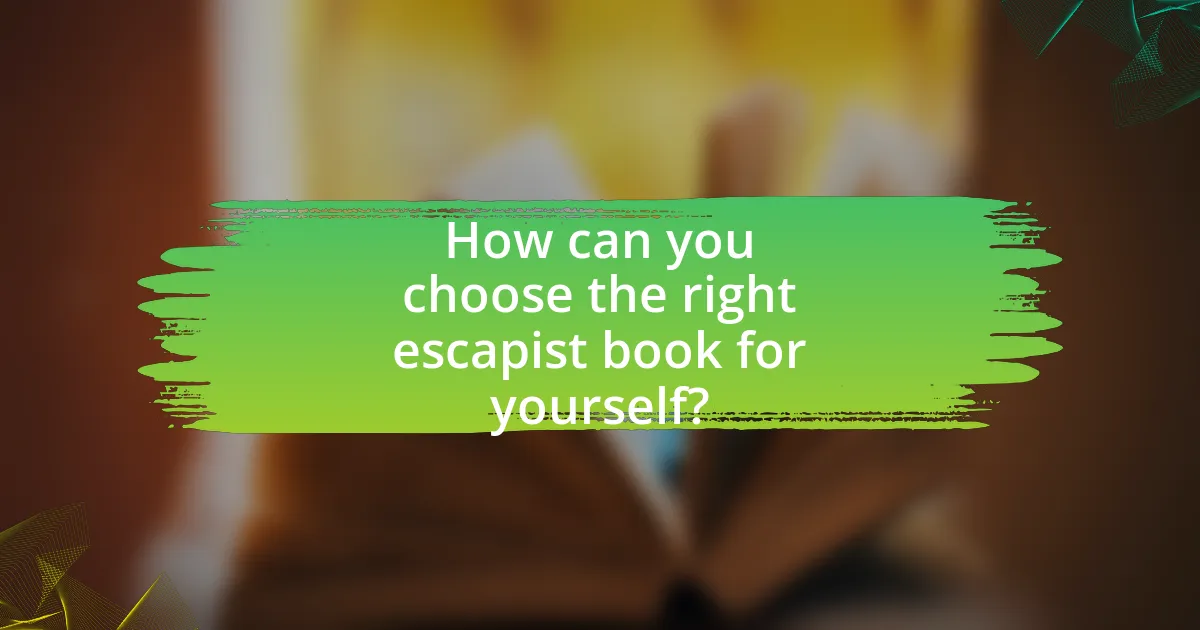
How can you choose the right escapist book for yourself?
To choose the right escapist book for yourself, identify your preferred genres and themes that resonate with your interests. For instance, if you enjoy fantasy, look for books that create immersive worlds, such as J.R.R. Tolkien’s “The Lord of the Rings,” which is renowned for its detailed world-building and adventure. Additionally, consider the emotional tone you seek; if you want light-heartedness, a romantic comedy like “The Rosie Project” by Graeme Simsion may be ideal. Researching book reviews and recommendations can also guide your selection, as platforms like Goodreads provide user ratings and insights that reflect the experiences of other readers.
What factors should you consider when selecting an escapist book?
When selecting an escapist book, consider the genre, writing style, and emotional engagement. The genre influences the type of world you will enter; for instance, fantasy and science fiction often provide immersive experiences. The writing style affects readability and enjoyment; a lyrical prose may enhance the escapism. Emotional engagement is crucial, as books that resonate with personal feelings can create a deeper connection, making the escape more profound. Research indicates that readers often prefer genres that align with their interests and emotional needs, enhancing their overall experience.
How do personal preferences influence your choice of escapist literature?
Personal preferences significantly influence the choice of escapist literature by guiding readers toward genres, themes, and styles that resonate with their individual tastes and experiences. For instance, a reader who enjoys fantasy may gravitate towards richly imagined worlds and magical elements, while someone with a preference for realism might seek out contemporary fiction that reflects their own life experiences. Research indicates that personal interests, such as hobbies or life circumstances, shape reading choices, as individuals often select books that provide comfort or an escape from their daily realities. This alignment between personal preferences and literary selection enhances the immersive experience, making escapist literature more appealing and effective in providing a temporary reprieve from everyday life.
What role do recommendations and reviews play in your selection process?
Recommendations and reviews significantly influence the selection process for books, particularly in the context of literary escapism. They provide insights into the quality and appeal of a book, helping readers gauge whether it aligns with their interests in immersive narratives. Research indicates that 79% of consumers trust online reviews as much as personal recommendations, highlighting their importance in decision-making. This trust in reviews and recommendations can lead to increased engagement with books that promise to transport readers to different worlds, ultimately shaping their reading choices.
What tips can enhance your experience of Literary Escapism?
To enhance your experience of literary escapism, immerse yourself in a quiet, comfortable environment free from distractions. This setting allows for deeper engagement with the narrative, facilitating a stronger emotional connection to the story. Research indicates that a conducive reading environment can significantly improve comprehension and enjoyment, as noted in studies on reading habits and their effects on cognitive absorption. Additionally, selecting genres that resonate with your interests, such as fantasy or historical fiction, can further enhance the escapism experience by aligning the narrative with your personal preferences.
How can you create the perfect reading environment for escapism?
To create the perfect reading environment for escapism, ensure a quiet, comfortable space with minimal distractions. This involves selecting a cozy chair or nook, using soft lighting to create a warm atmosphere, and eliminating noise through soundproofing or soft background music. Research indicates that a well-lit, comfortable environment enhances focus and immersion, allowing readers to fully engage with the narrative. Additionally, incorporating elements like blankets, pillows, and personal items can foster a sense of safety and relaxation, further enhancing the escapist experience.
What practices can help you immerse yourself fully in a book?
To immerse yourself fully in a book, create a distraction-free environment that enhances focus and engagement. This practice is supported by research indicating that minimizing external stimuli allows for deeper cognitive absorption in the narrative. For instance, a study published in the Journal of Experimental Psychology found that individuals reading in quiet settings retained more information and experienced greater emotional connection to the text compared to those in noisy environments. Additionally, setting aside dedicated reading time without interruptions fosters a routine that encourages deeper involvement with the material.
